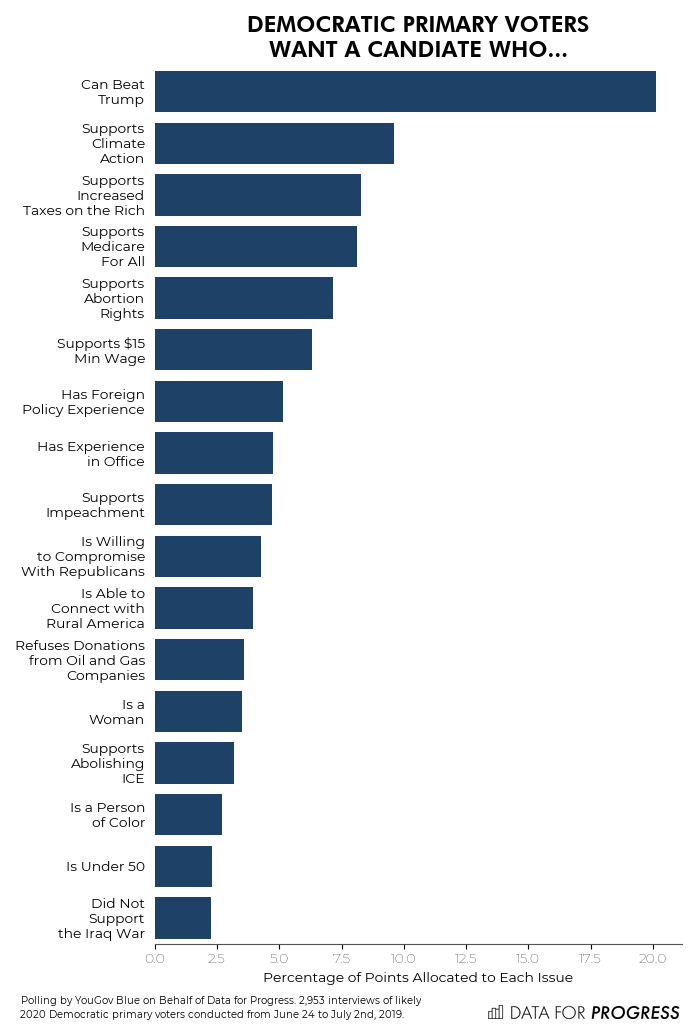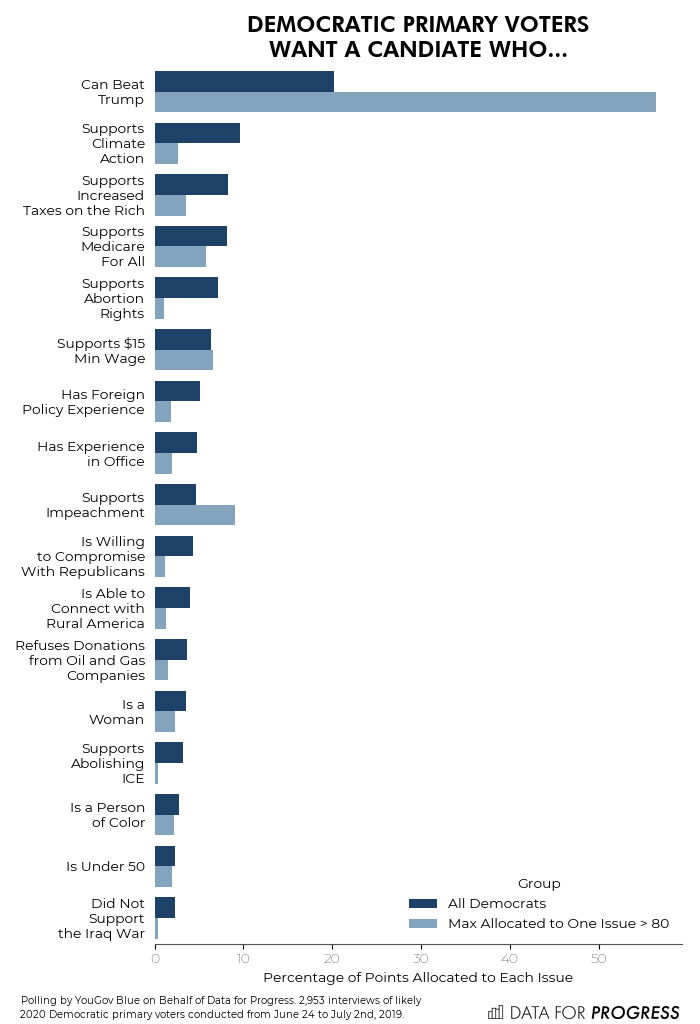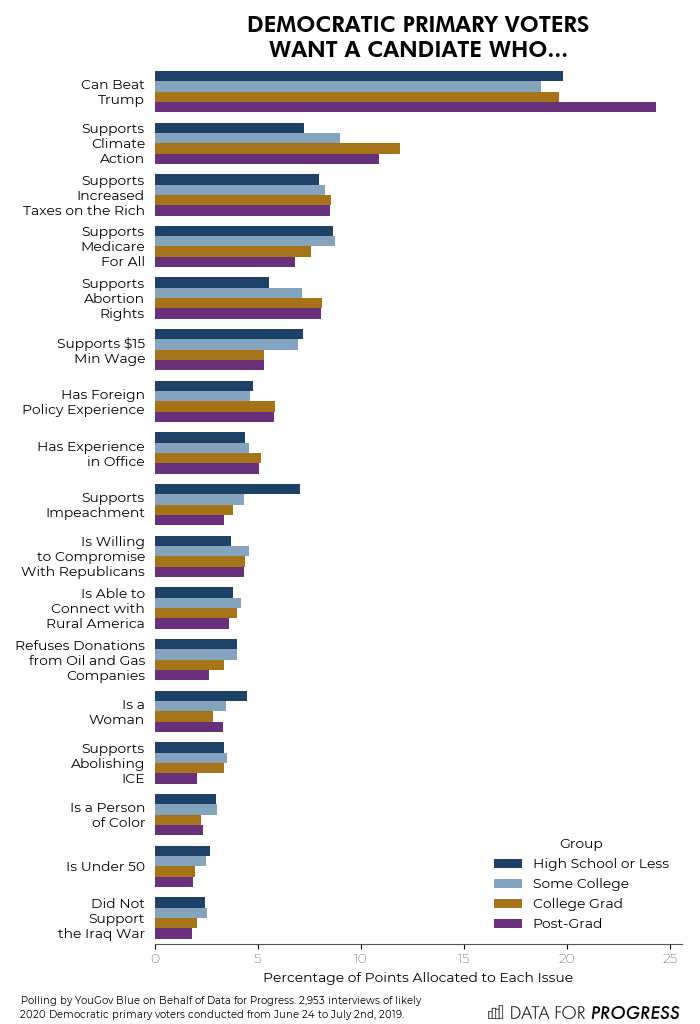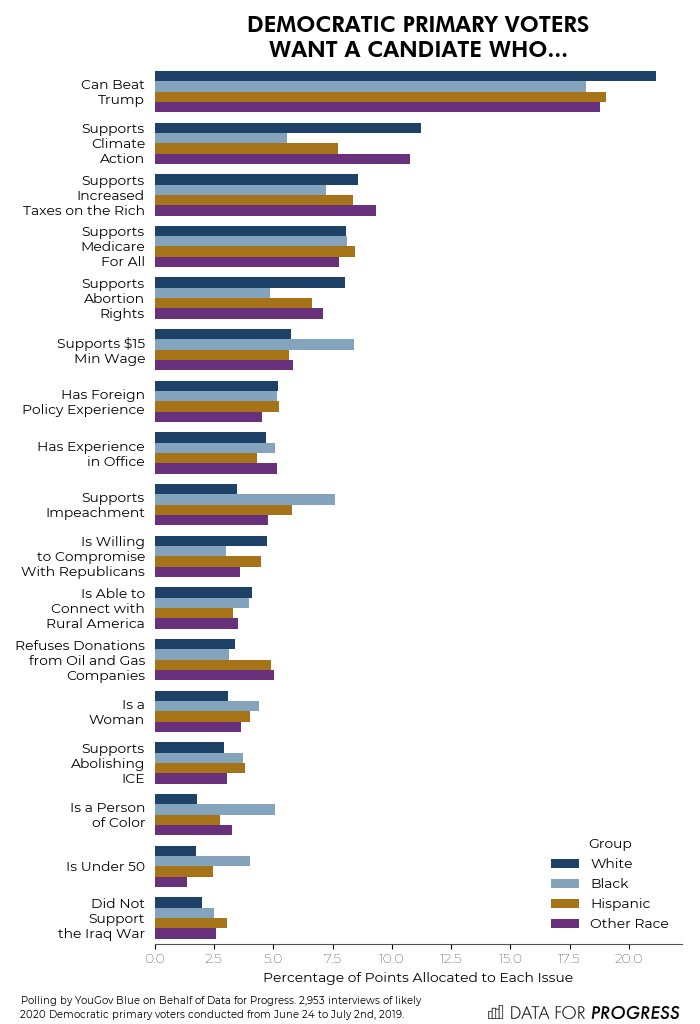2020 Democratic Electorate Shows Broad Agreement on Priorities
By Colin McAuliffe (@ColinJMcAuliffe)
As part of our ongoing analysis of the 2020 Democratic primary, we asked a large sample of Democrats to allocate 100 points to different characteristics they want to see in the Democratic nominee. Giving respondents a fixed amount of points to allocate reveals priorities not easy to capture with standard polling questions or even ranking. Last fall, we wrote a series of posts using this method, which revealed that Democratic voters’ priorities are surprisingly uniform, despite the fact that the party has a demographically and ideologically diverse base.
The characteristics that respondents ranked included personal characteristics like past experience in politics, candidate demographics, policy positions like taxing the wealthy and climate action, and characteristics related to the candidate’s perceived electability.
Democrats put the ability to beat Trump as their highest priority by a substantial margin. Several progressive policy priorities, such as climate action, increased taxes on the wealthy, Medicare for All, and abortion rights, came in as top priorities next to ability to beat Trump. The second place priority was supporting action on climate change, which garnered a little over half the points that were allocated towards the ability to beat trump. Below we unpack the priorities across different subgroups in the Democratic Party as there are some meaningful differences, though we have yet to find any subgroup where beating Trump was not the top priority.
While beating Trump is the clear priority, most Democrats spread their points out across a number of characteristics. Only 9% of Democrats allocated 80 or more of their points to a single topic, but among those single issue voters, they overwhelmingly want to get rid of Trump.
Breaking down the results by self identified ideological labels reveal that there are not especially compelling ideological divides. Even the leftmost wing of the Democratic Party places the ability to beat Trump as the most important candidate characteristic, though they also place more weight on additional policy goals. Progressives and Socialists placed above average weight on climate action, progressive taxation, Medicare for All, and abortion rights. Moderates placed an above average weight on compromise with Republicans, connecting with rural America, and experience. However, even among Moderates, these characteristics were not rated as more important than the progressive policy goals that the left-wing of the party placed as top priorities.
Education reveals some variation on secondary priorities. For example, higher education is associated with higher priority on climate action and the protection of abortion rights. Lower education is associated with higher priority on minimum wage, impeachment, and Medicare for All. Again, all groups prioritize the ability to beat Trump, but post-grads prioritize this more than the others.
African-American Democrats prioritize minimum wage, impeachment, and descriptive representation more than other groups. In general, the demographic characteristics of a candidate were not given an especially high weight by respondents. Other polls suggest that Democrats disfavor certain candidate characteristics, although here we find that when we force respondents to consider the tradeoffs between multiple characteristics, descriptive representation tends to get bumped down.
We need to be careful here to not over interpret this result. The allocator method is useful because it reveals priorities by forcing respondents to choose between alternatives, but that does not mean this necessarily reflects real-world tradeoffs. For example, increased representation need not come at the expense of beating Trump or any policy goal. In fact, there is convincing evidence that diverse candidates can mobilize under-represented groups.
Breaking priorities down by age, we once again see that the ability to beat Trump is everyone’s top priority. Younger voters are likely to place more weight on additional policy priorities, especially climate action and Medicare for All.
These results show that Democrat’s priorities are fairly homogeneous relative to how demographically and ideologically diverse the base is. Everyone agrees that beating Trump is the most important priority, but very few think that this is the only thing that matters. Moderates and Socialists alike think that the nominee should support action on climate change and increasing taxes on the wealthy.
Much of the disagreement within the base does not boil down to priorities, but instead on how to tackle the challenges the party faces. These are the questions that Democratic candidates needs to answer: what is the best strategy to beat Trump in the general election? What should Medicare for All look like? How do we solve the climate crisis and reduce economic inequality?
Colin McAuliffe (@ColinJMcAuliffe) is a co-founder of Data for Progress.






